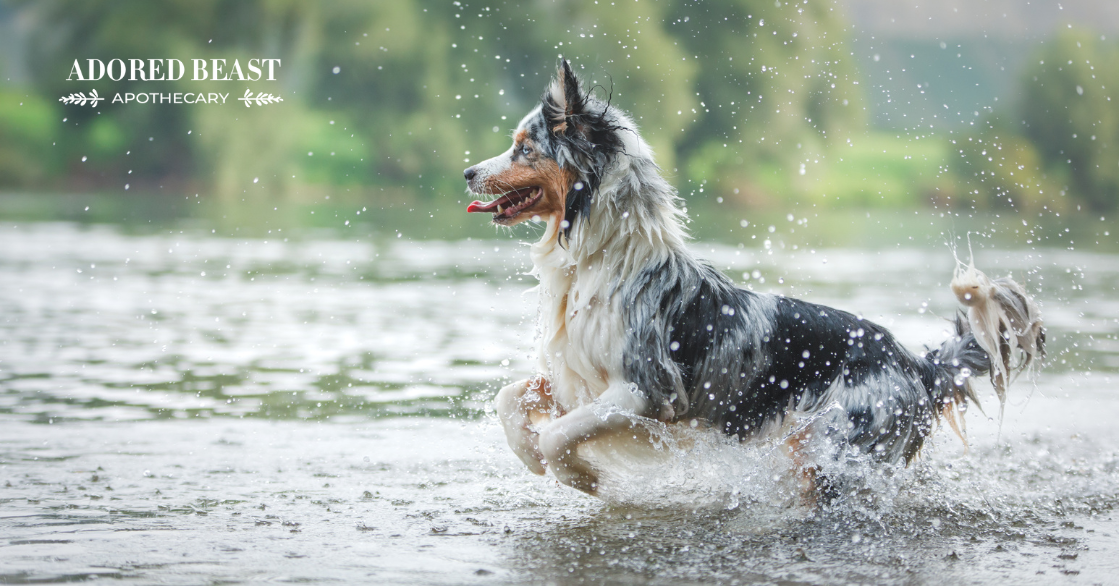As a homeopath, our founder, Julie Anne Lee, DCH, is always considering the ways that homeopathic remedies can contribute to the health and wellness of our animals. Homeopathy features in a lot of what we do at Adored Beast, from considering formulations to education.
Because of its effectiveness and its ability to complement so many other treatment modalities, it comes as no surprise that homeopathy is really growing in popularity.
And that means there’s a growing awareness of the different remedies available and how each one supports the body in various ways.
Every so often, we like to pick out one of those remedies and feature it, so today, we’re celebrating homeopathic Silicea for pets and all it has to offer!
What is Silicea?
Silicea is a compound of the two most abundant elements in Earth’s crust, silicon and oxygen. In fact, the mass of the Earth’s crust is 59% silicea, the main constituent of more than 95 percent of the known rocks.
Silicea sand is used in buildings and roads in materials such as cement, concrete, and mortar. Silica also is used in grinding and polishing glass and stone, in the manufacture of glass, and ceramics.
In homeopathy, silicea has a profound cleansing effect on the body.
Originating from Samuel Hahnemann’s principles in the late 18th century, homeopathy emphasizes the use of highly diluted substances to stimulate the body’s innate healing mechanisms. The idea is that a remedy mimics a disease state, which can help stimulate the body to initiate its own natural healing processes.
Remedies are made by diluting them to minute numbers. Not once, not twice, but thousands of times. For example, Silicea 30C has been diluted 3000 times! A stronger potency, 1M for example, is even more diluted. In fact, with homeopathy, the smaller the crude substance, the bigger the benefits.
Homeopathic Silicea for Pets
Homeopaths choose homeopathic Silicea for pets to address various physical symptoms. It’s a first go-to for supporting the body in pushing out anything that’s foreign. Silicea helps the body to expel or root out congestions and irritants, and eliminate non-functional matter, and is also useful for blocked tear ducts and salivary glands.
Silicea is also commonly used for conditions associated with weakened immune function, such as recurrent infections, colds, ailments related to skin conditions, dental problems, and slow wound healing.
Here are a few of the things Silicea for pets is often indicated for:
- Vaccinosis: By far, our most favourite use for Silicea is to combat the ill effects of over-vaccination. Without removing the benefits of vaccines, Silicea helps to address the negative side effects. (That’s why it’s in our Rebalancer!)
- Anal Gland Issues: Along with Aconite, Arnica, and Hepar sulph, Silicea can help “push out” what needs to come out. With Silicea, you don’t want to go any higher than 30C for impacted anal glands. High potency Silicea helps the body resolve something, whereas low potency pushes things out (which is what you want).
- Foreign Bodies: Silicea can be helpful in expelling foreign bodies, such as thorns, seeds, or splinters, from the skin. It helps splinters rise up to the surface.
- Wound Healing: Silicea is indicated often for chronic wounds, ulcers, boils, and abscesses, particularly with wounds that are slow to heal.
- Tooth Issues: Silicea can be useful with oral care, particularly with regard to cavities, crumbling teeth, breaking or fracturing teeth easily, as well as to help rebuild tooth enamel. It works well in combination with a few other remedies (find them at this post).
How to Use Silicea for Pets
You can find homeopathic Silicea for pets (it’s the same as for humans) online or at your local health food shop. It comes in a variety of different potencies. For those new to homeopathy, go with a 30C potency and look for the remedy in pellet form.
First things first – and this is important. Homeopathy is not like a drug. The amount isn’t based on weight, and it doesn’t matter if your animal has 2 pellets or 6. Again, hard to wrap your head around this one, but it’s just the way it works. As long as some of the remedy gets into your pet, the energy of the remedy will be able to get to work.
If your animal will take the pellets without issue by mouth, that’s an easy way to do it. They even have this perfect little pocket just inside their cheek that you can pop the remedy into. For cats, or pickier dogs, this might not be the easiest option. In this case, stir a few pellets into a small cup of water and give the water to your animal. That works too.
**Whenever you give a remedy, try not to touch the pellet with your fingers, and try not to touch the container to your pet’s mouth. If the container comes in contact with your animal’s mouth, wash it with hot, soapy water and make sure it dries completely.
Give the remedy and watch for any signs of improvement. If, after 30 minutes or so, you haven’t noticed a change, give it again. If, after that, you’re still not seeing a change, perhaps try a different remedy.
Homeopathic Silicea for pets offers a gentle and effective approach to supporting the health and well-being of our animals. Even if you just have it to clear our the effects of over-vaccination, it can be incredibly valuable. With its origins rooted in natural healing principles, Silicea can address a wide range of symptoms in our adored beast, promoting internal balance, harmony, and vitality.












